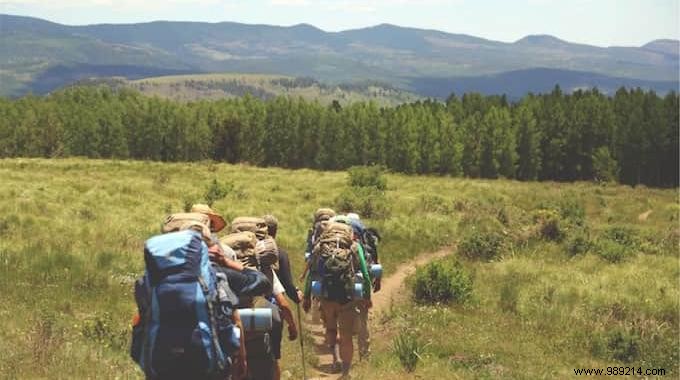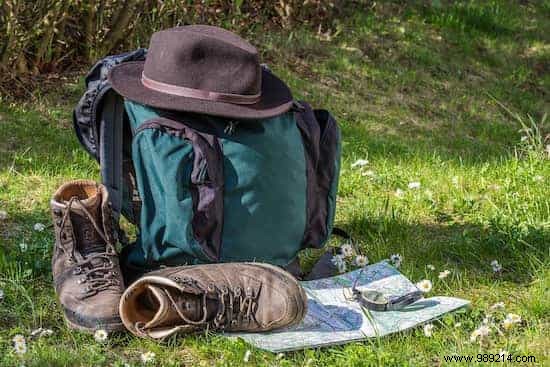
"The peace of nature will flow through your body, like the rays of the sun cross the trees.
The winds will blow their coolness into you, and the storms their energy, while cares will fall like autumn leaves. »
It's in his book Our National Parks John Muir summed up the benefits of time in nature so well.
Much like John Muir, most of us recognize that hiking is good for body, mind, and soul.

Indeed, we all know the sensations of a good walk in the forest.
For example, observe the birds and the foliage of various colors, smell the sweet scent of the spruces and pines, listen to the relaxing flow of a stream or a river...
Nature walks help us keep our minds clear and bring usa lasting feeling of well-being .
And it's not the doctors who will say the opposite!
Successive studies all show that hiking has many benefits for our mental health.
Here are the 5 scientifically proven health benefits of hiking:

People who constantly ruminate on negative ideas and focus too much on their toxic thoughts develop symptoms associated with anxiety, depression and other psychological disorders, such as compulsive snacking and even post-traumatic stress. .
Stanford University researchers studied the effect of hiking on mental rumination. They have discovered that it can significantly reduce the frequency of these negative thoughts.
For this study, the researchers compared the levels of mental rumination of the participants, divided into 2 groups:the 1st group having hiked in an urban environment and the 2nd having hiked in a natural environment.
The researchers thus discovered that people who walked for 90 minutes in a natural environment felt less mental rumination .
Furthermore, the researchers also found that these same people had reduced activity in the ventromedial prefrontal cortex.
Why is this important? Because this part of the brain is associated with mental disorders .
On the other hand, people who walked in urban areas did not feel these benefits at all.
The researchers of the Stanford study explain that our world is becoming more and more urban.
However, the phenomenon of urbanization is closely linked to depression and other forms of psychological disorders.
Clearly, spending more time outdoors — where there is less stress, less noise, and fewer distractions — and less time in urban settings has significant benefits for our mental health.
To discover: 12 Toxic Thoughts To Avoid For A Better Life.

According to a study conducted by Drs Atchley and Strayer, professors of psychology, we are more creative in solving the problems we face when we are disconnected from technology and reconnect with nature.
For this study, participants went on a 4-day nature hike during which they were not allowed to use their smartphones, tablets or laptops.
During the hike, the researchers asked the participants to perform tasks that required creativity to solve complex problems.
Drs Atchley and Strayer found that people hiking without a smartphone improved their performance by 50% in solving complex problems.
Dr. Atchley and Dr. Strayer explain that modern technology and the noise pollution of urban areas constantly demand our attention and prevent us from concentrating.
Therefore, a hike in nature is a powerful remedy when you feel overwhelmed by the stress of city life, but also by the fact of being connected 24 hours a day because of your smartphone.
In short, hiking reduces our level of mental fatigue, quiet our mind and help us develop our ability to solve problems .

Attention Deficit Hyperactivity Disorder (ADHD) is one of the most common learning disabilities in children.
Children with ADHD have difficulty staying focused, are easily distracted, show signs of hyperactivity, and have trouble controlling their impulses.
Raising a child with ADHD is a trying experience for parents. Despite this, new medical and scientific research is promising.
Indeed, in this study, Drs. Kuo and Faber Taylor demonstrated that activities in green spaces reduce the symptoms of ADHD .
According to the study, spending time in nature also has benefits for people with attention deficit and impulsivity problems.
For example, sitting for a long time in a chair with a view of a green space, taking an afternoon walk in a natural environment or simply playing ball on a soccer field are good examples of activities that can relieve unwanted symptoms of ADHD .
To discover: 10 Things To Stop Saying To Your Kids (and What To Say Instead).

Everyone knows the old adage:a healthy mind in a healthy body . Well, hiking is a great form of physical activity.
Depending on the difficulty of the route, a hike of only 1 hour can burn between 400 and 700 calories.
Another great thing about hiking is that it puts much less stress on your joints than most other sports activities, such as running.
Moreover, it is also scientifically proven that people who engage in physical activity outdoors are more likely to continue throughout the year than for other activities.
In fact, hiking is an excellent choice for people wishing to incorporate regular physical activity in their daily life.
In addition, this physical activity keeps brain cells healthy and ensures their proper functioning.
In fact, researchers at the University of British Columbia believe that cardio exercises have the power to improve memory and increase our cognitive abilities .
In their study, these researchers found that physical activities such as cardio or aerobics increase hippocampal volume in older women.
The hippocampus is the area of the brain associated with spatial memory as well as episodic memory.
The results of this study indicate that outdoor physical activity improves our cognitive abilities and reduces the deterioration of cognitive functions.
Not to mention the fact that physical activity like hiking reduces stress and anxiety levels, increases self-confidence and stimulates the production of endorphins (the hormones associated with feelings of well-being and euphoria).
On closer inspection, it is incredible that such a simple and inexpensive physical activity that hiking can have so many benefits for our mental health!

Has your doctor ever “sent you off”? This is an expression that you don't necessarily want to hear, especially from your doctor!
But in reality, it's a benevolent recommendation.
Indeed, progressive doctors know that people who spend more time in natural surroundings have reduced stress levels and better overall physical health .
More and more doctors are writing "nature prescriptions" or recommending ecotherapy to reduce anxiety, stress and to fight depression.
In addition, "nature prescriptions" are increasingly recognized by healthcare providers, as numerous studies reveal the benefits of physical exercise and time spent in nature.
This is the case, for example, in the United States in California, where the Golden Gate Institute promotes ecotherapy, through its "Healthy Parks Healthy People" program (in French:healthy green spaces for healthy people ).
In this program, local organizations work with health professionals to promote green spaces and their therapeutic use by residents.

Hiking is one of the easiest and least expensive sports that you can practice. In addition, hiking is a fun and beneficial activity for the whole family .
- if you are a beginner, do not try to tackle the difficult paths, such as the GR20 or the most demanding stages of the Camino de Santiago right away. Instead, try to start with small hikes in your area. Discover the small paths around your city and gradually progress to hikes whose difficulty and length correspond to your pace.
- search online for hiking guides in your area. There are also smartphone applications to find tracks or trails that correspond to your level and your tastes.
- take care to wear sturdy hiking shoes that are suitable for the terrain.
- also consider investing in a pair of walking poles, which reduce stress on the knees, increase your cadence and improve your balance.
- plan as many clothes as necessary depending on the weather. Only wear airy clothes made of fabrics that breathe and resist moisture (such as silk, polypropylene, wool and fleeces):these materials reduce perspiration and retain heat.
- use sunscreen and sunglasses to protect yourself from the sun.
- finally, don't forget to protect yourself from the dangers of dehydration… and to enjoy your walk! :-)